Environmental Effects of Offshore Drilling and Production – IELTS Reading Answers
Table of Contents

Limited-Time Offer : Access a FREE 10-Day IELTS Study Plan!
The Reading Module of the IELTS can be the top-scoring category, with diligent practice. To achieve the best results in this section, you must understand how to approach and answer the different Question types in the Reading Module. By solving and reviewing Sample Reading Questions from past IELTS papers, you can ensure that your Reading skills are up to the mark.
The Academic passage ‘Environmental Effects of Offshore Drilling and Production’ is a reading passage that appeared in an IELTS Test.
Ideally, you should not spend more than 20 minutes on a passage. Let’s see how easy this passage is for you and if you’re able to make it in 20 minutes. If not, try more IELTS reading practice test from IELTSMaterial.com
Environmental Effects of Offshore Drilling and Production
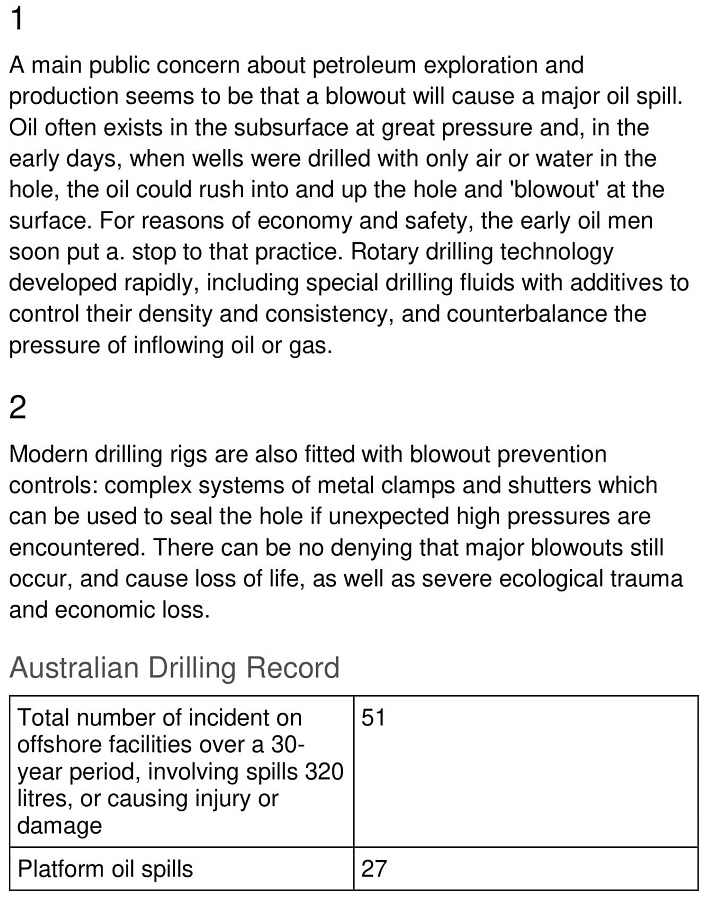
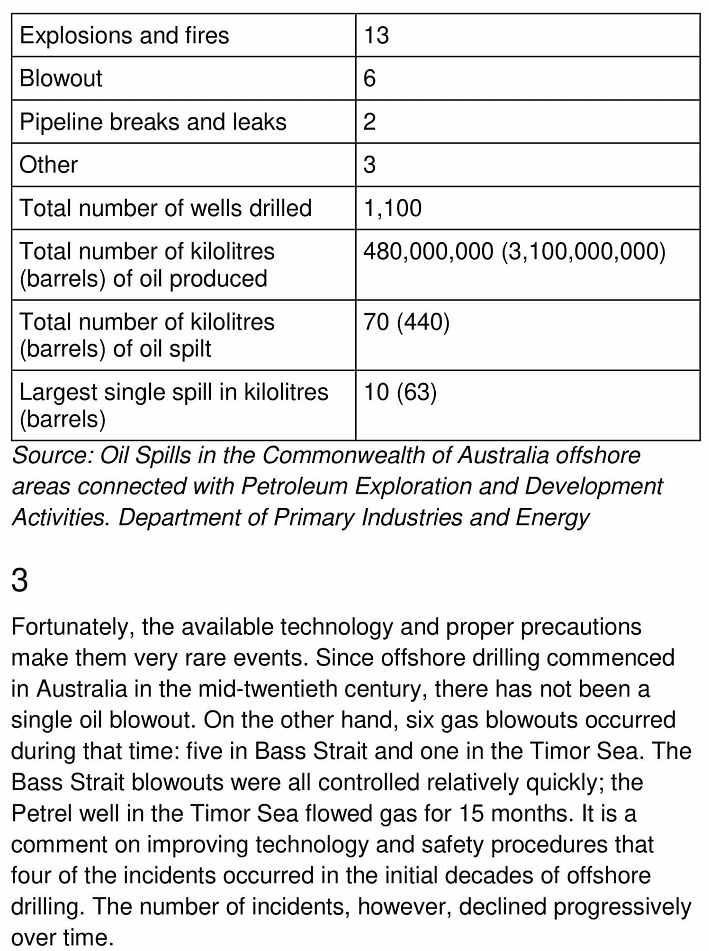
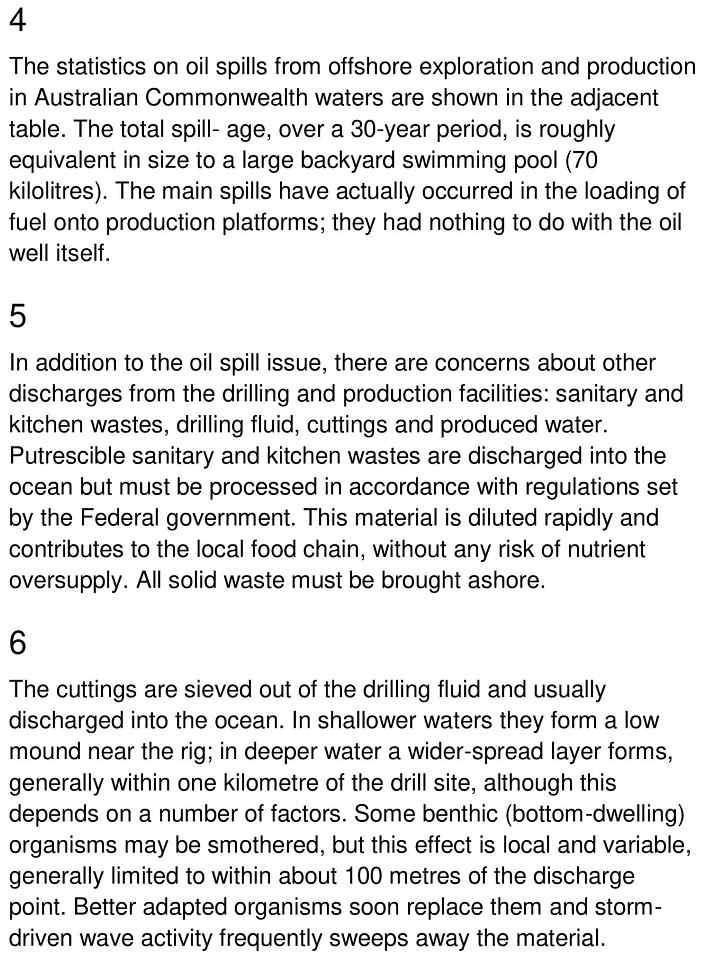
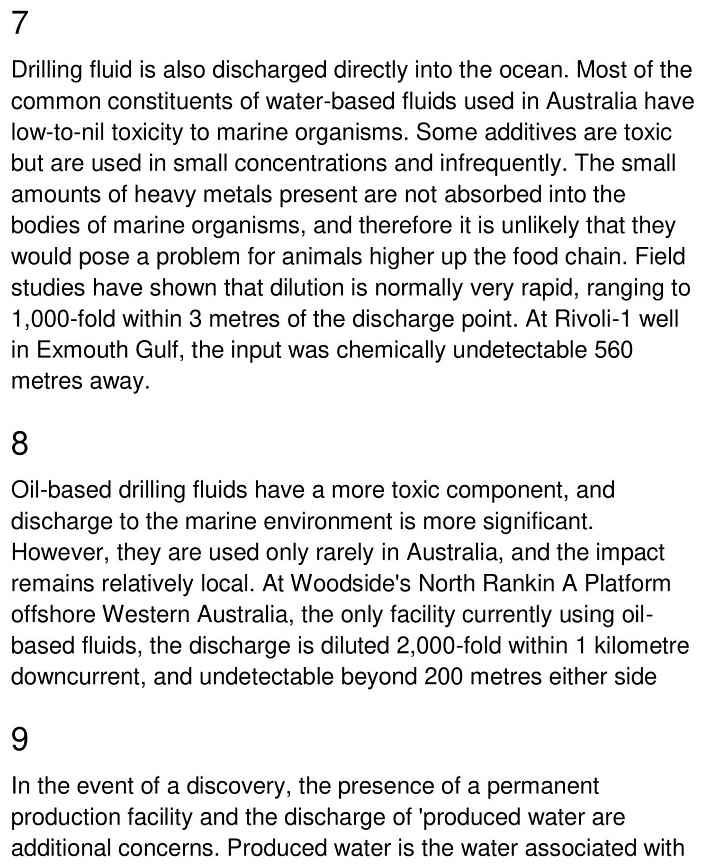
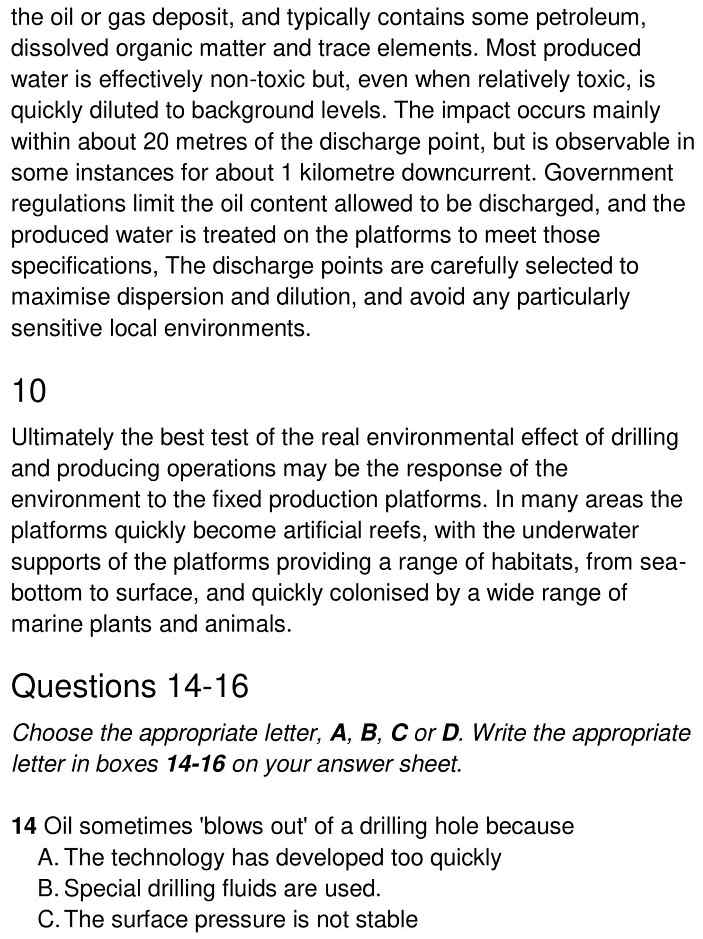
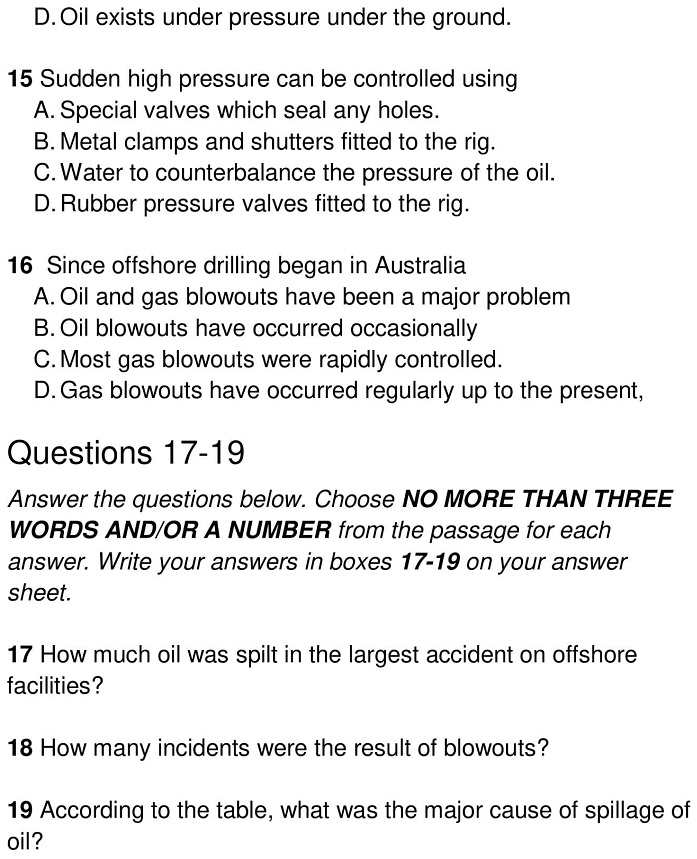
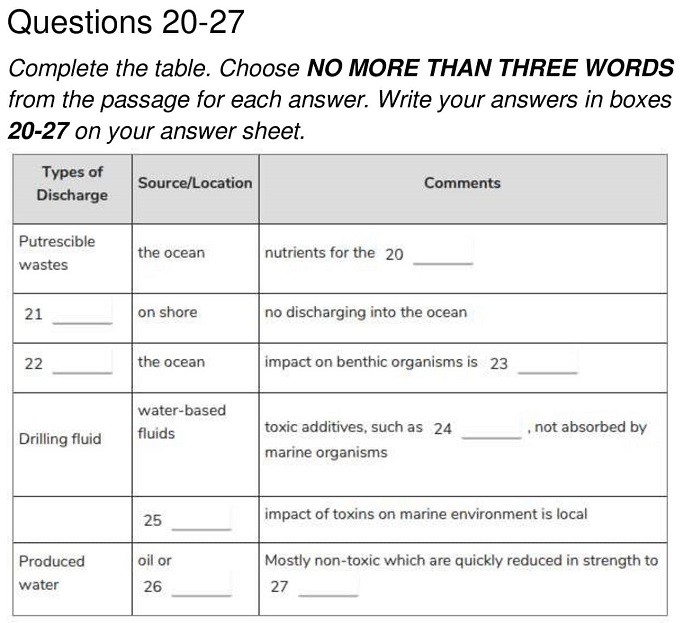
Answers
| Question number | Answer | Explanation |
|---|---|---|
| 14 | D | Paragraph 1 clearly states that “Oil often exists in the subsurface at great pressure and, in the early days, when wells were drilled with only air or water in the hole, the oil could rush into and up the hole and ‘blowout’ at the surface.” From these lines, we can infer that oil exists on the surface of the hole, and due to the pressure of any other substances like air or water, it gets blown out. Hence, the correct answer is “D.” |
| 15 | B | The first line of Paragraph 2 mention that “modern drilling rigs are also fitted with blowout prevention controls: a complex system of metal clamps and shutter which can be used to seal the hole if unexpected high pressures are encountered.” The phrase ‘metal clamps and shutter which can be used to seal the hole’ confirms that the correct answer is “B.” |
| 16 | C | As per the lines of Paragraph 3, “offshore drilling commenced in Australia in the mid-twentieth century, there has not been a single oil blowout. On the other hand, six gas blowouts occurred during that time: five in the Bass Strait and one in the Timor Sea. The Bass Strait blowouts were all controlled relatively quickly.” From the words ‘six gas blowouts occurred’ and ‘all controlled relatively quickly’, we can deduce that gas blowouts were rapidly controlled because of offshore drilling in Australia. Hence, the correct answer is “C”. |
Unlock Answers
| 17 | 10 Kiloliters/63 barrels | In Paragraph 2, the last section of the table demonstrates the large single oil spills in the Commonwealth of Australia offshore areas. Hence, the correct answer is “10(63)”. |
| 18 | 6 | Paragraph 2, table and passage 3 both state that “six gas blowouts occurred during that time.” Hence, the correct answer is “6”. |
| 19 | Platform oil spills | Paragraph 2, the second section of the table, demonstrates the major cause of oil spillage in the Commonwealth of Australia offshore areas is platform oil spills since the count is 27. Hence, the correct answer is “platform oil spills”. |
| 20 | Local food chain | Paragraph 5 states that “this material is diluted rapidly and contributes to the local food chain, without any risk of nutrient oversupply.” From this information, we can deduce that putrescible wastes are discharged into the ocean that supplies the nutrients for the local food chain. Hence, the correct answer is “local food chain”. |
| 21 | Solid waste | Paragraph 5 also mentions that “material is diluted rapidly and contributes to the local food chain, without any risk of nutrient oversupply.” Therefore, “all solid waste must be brought ashore.” From the term ‘solid waste must be brought ashore’, we can imply that solid waste is discharged into the ocean, which should be brought on the shore. Hence, the correct answer is “solid waste”. |
| 22 | cuttings | As per the first line of Paragraph 6, the “cuttings are sieved (removed) out of the drilling fluid and usually discharged into the ocean.” From this line, we can infer that cutting is another type of discharge that is discharged in the ocean. Hence, the correct answer is “cuttings.” |
| 23 | Local and variable | The first line of Paragraph 6 claims that “some benthic organisms may be smothered, but this effect is local and variable, generally limited to within about 100 metres of the discharge point.” According to this information, some benthic organisms suffer due to the discharge in the ocean, but its impact on these organisms is local and variable. Hence, the correct answer is “local and variable”. |
| 24 | Heavy metals | There’s a line in Paragraph 7 which conveys that “water-based fluids used in Australia have low-to-nil toxicity to marine organisms. Also, the small amount of heavy metals present are not absorbed into the bodies of marine organisms.” From the phrase, ‘small amounts of heavy metals present are not absorbed into the bodies of marine organisms, we can deduce that heavy metals are toxic additives that are not absorbed by marine organisms. Hence, the correct answer is “heavy metals.” |
| 25 | Oil-based (drilling) (fluids) | In Paragraph 8, the first line states that “oil-based drilling fluids have a more toxic component, and discharge to the marine environment is more significant.” Therefore from the line above, we can deduce that oil-based drilling fluids have the most toxic impact on the marine environment since it is a toxic component. Hence, the correct answer is “oil-based drilling fluids”. |
| 26 | Gas deposit | The line “water associated with the oil or gas deposit, and typically contains some petroleum, dissolved organic matter and trace elements” from Paragraph 9 confirms that the water is toxic. Other than oil, toxic water is sourced from gas deposits. Hence, the correct answer is “gas deposit”. |
| 27 | Background levels | In Paragraph 9 the author claims that “most produced water is effectively non-toxic but, even when relatively toxic, is quickly diluted to background levels.” Therefore, it implies that water is generally non-toxic, but when water is mixed to background levels, it loses its strength. Hence, the correct answer is “background levels”. |
Check More IELTS Reading Answers
Also check :
Practice IELTS Reading based on question types

Start Preparing for IELTS: Get Your 10-Day Study Plan Today!
Explore other Reading Topics

Janice Thompson

Janice Thompson
Recent Articles

Kasturika Samanta

Kasturika Samanta

Janice Thompson


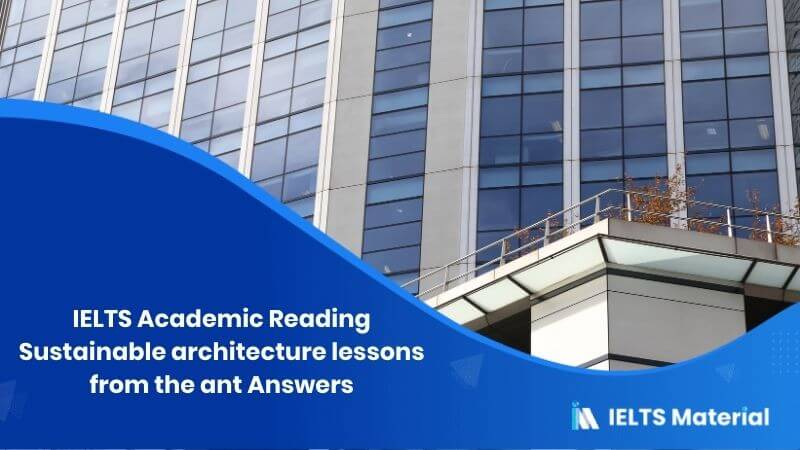
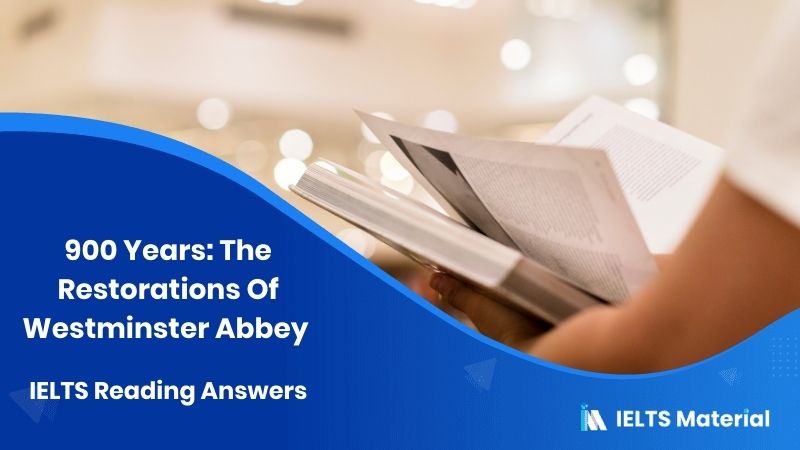



Post your Comments